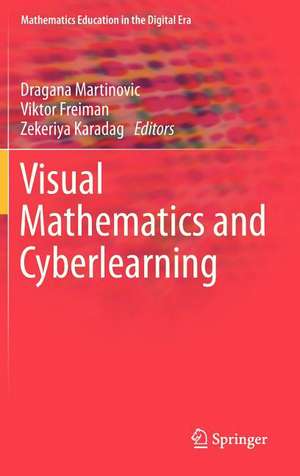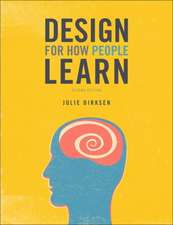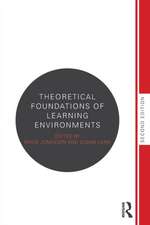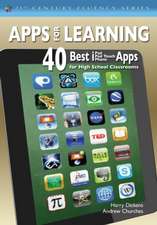Visual Mathematics and Cyberlearning: Mathematics Education in the Digital Era, cartea 1
Editat de Dragana Martinovic, Viktor Freiman, Zekeriya Karadagen Limba Engleză Hardback – 23 dec 2012
| Toate formatele și edițiile | Preț | Express |
|---|---|---|
| Paperback (1) | 638.57 lei 6-8 săpt. | |
| SPRINGER NETHERLANDS – 29 ian 2015 | 638.57 lei 6-8 săpt. | |
| Hardback (1) | 644.82 lei 6-8 săpt. | |
| SPRINGER NETHERLANDS – 23 dec 2012 | 644.82 lei 6-8 săpt. |
Din seria Mathematics Education in the Digital Era
- 15%
 Preț: 642.68 lei
Preț: 642.68 lei - 24%
 Preț: 739.43 lei
Preț: 739.43 lei - 18%
 Preț: 782.42 lei
Preț: 782.42 lei - 18%
 Preț: 1127.15 lei
Preț: 1127.15 lei - 18%
 Preț: 959.36 lei
Preț: 959.36 lei - 18%
 Preț: 952.26 lei
Preț: 952.26 lei - 24%
 Preț: 804.90 lei
Preț: 804.90 lei - 18%
 Preț: 990.93 lei
Preț: 990.93 lei -
 Preț: 438.10 lei
Preț: 438.10 lei - 18%
 Preț: 953.03 lei
Preț: 953.03 lei - 18%
 Preț: 889.92 lei
Preț: 889.92 lei - 24%
 Preț: 825.42 lei
Preț: 825.42 lei - 24%
 Preț: 752.34 lei
Preț: 752.34 lei -
 Preț: 360.15 lei
Preț: 360.15 lei - 15%
 Preț: 649.06 lei
Preț: 649.06 lei - 20%
 Preț: 573.76 lei
Preț: 573.76 lei -
 Preț: 394.29 lei
Preț: 394.29 lei -
 Preț: 389.88 lei
Preț: 389.88 lei - 15%
 Preț: 649.54 lei
Preț: 649.54 lei - 18%
 Preț: 1117.50 lei
Preț: 1117.50 lei - 18%
 Preț: 1112.78 lei
Preț: 1112.78 lei
Preț: 644.82 lei
Preț vechi: 758.60 lei
-15% Nou
Puncte Express: 967
Preț estimativ în valută:
123.38€ • 128.82$ • 102.12£
123.38€ • 128.82$ • 102.12£
Carte tipărită la comandă
Livrare economică 04-18 aprilie
Preluare comenzi: 021 569.72.76
Specificații
ISBN-13: 9789400723207
ISBN-10: 9400723202
Pagini: 260
Ilustrații: X, 250 p.
Dimensiuni: 155 x 235 x 20 mm
Greutate: 0.54 kg
Ediția:2013
Editura: SPRINGER NETHERLANDS
Colecția Springer
Seria Mathematics Education in the Digital Era
Locul publicării:Dordrecht, Netherlands
ISBN-10: 9400723202
Pagini: 260
Ilustrații: X, 250 p.
Dimensiuni: 155 x 235 x 20 mm
Greutate: 0.54 kg
Ediția:2013
Editura: SPRINGER NETHERLANDS
Colecția Springer
Seria Mathematics Education in the Digital Era
Locul publicării:Dordrecht, Netherlands
Public țintă
ResearchCuprins
1. Keith Jones, Eirini Geraniou, & Thanassis Tiropanis: Patterns of collaboration: Towards learning mathematics in the era of the semantic web.- 2. Gorjan Alagic & Mara Alagic: Collaborative mathematics learning in online environments.- 3. Murat Perit Cakir & Gerry Stahl: The integration of mathematics discourse, Graphical reasoning and symbolic expression by a Virtual Math Team.- 4. Beste Güçler, Stephen Hegedus, Ryan Robidoux, & Nicholas Jackiw: Investigating the Mathematical Discourse of Young Learners Involved in Multi-Modal Mathematical Investigations: The Case of Haptic Technologies.- 5. Dragan Trninic & Dor Abrahamson: Embodied interaction as designed mediations of conceptual performance.- 6. Luis Radford: Sensuous Cognition.- 7. George Gadanidis & Immaculate Namukasa: New media and online mathematics learning for teachers.- 8. Ann LeSage: Web-based video clips: A supplemental resource for supporting pre-service elementary mathematics teachers.- 9. Dragana Martinovic, Viktor Freiman, & Zekeriya Karadag: Visual mathematics and cyberlearning in view of Affordance and Activity Theories.
Textul de pe ultima copertă
The first volume in this new Springer series explores innovative ways of learning and doing mathematics to make it more appealing to the Net Generation. This generation consists of visual learners who thrive when surrounded with new technologies and whose diverse needs can be met by a variety of cyber tools. In their search for novel ways of studying, such as collaboration with peers and multitasking by using multimedia, the Internet, and other Information and Communication Technologies, they learn mathematics by playing games online, watching and sharing presentations on YouTube, exploring and creating Java applets of mathematics simulations and exchanging thoughts over the instant chat tools. This volume presents mathematics teaching and learning in a way that resonates with these new learners: as a contemporary subject that is engaging, exciting and enlightening. It offers educators insight into how they can make meaningful use of the dynamic, interactive, collaborative, and visual nature of new learning environments while having a deeper understanding of their potential advantages and limitations.
This volume:
- Bridges the gap between Net Generation learners and mathematics education
- Presents conceptual frameworks for research in this area
- Explores research data that shed a light on innovative theories and practices in the field of visual mathematics and cyberlearning.
This volume:
- Bridges the gap between Net Generation learners and mathematics education
- Presents conceptual frameworks for research in this area
- Explores research data that shed a light on innovative theories and practices in the field of visual mathematics and cyberlearning.
Caracteristici
Offers a platform for dissemination of new ideas in visual mathematics and cyberlearning Addresses new developments in the field Evokes new theoretical perspectives in mathematics education










